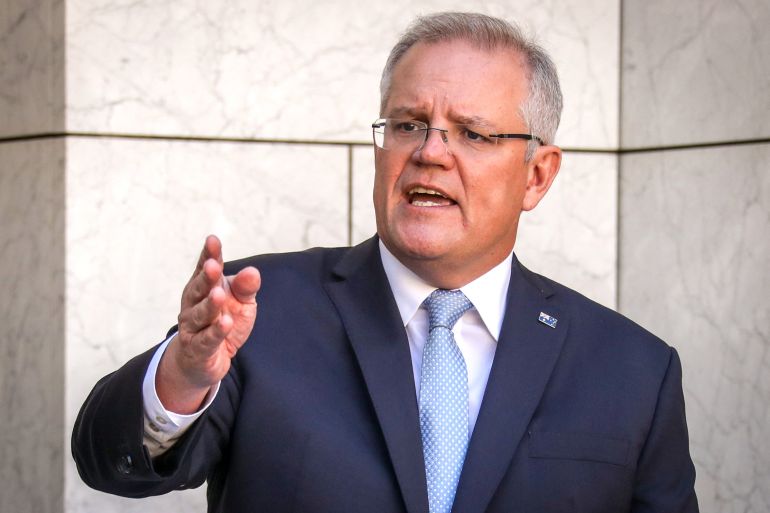Australia tables contentious religious anti-discrimination bill
Prime minister says bill will protect people of faith against ‘cancel culture’, critics say it will make lawful what is considered discrimination now.

Scott Morrison, Australia’s prime minister, has introduced to Parliament a contentious bill on religious discrimination that he says will protect people of faith against “cancel culture”.
The bill, submitted on Thursday, is seen as a bid to win over religious voters ahead of next year’s election and comes amid concerns from some that followers from churches, schools, and workplaces are unable to express their religious beliefs.
Keep reading
list of 4 itemsAustralia to allow skilled workers, students entry from December
Thousands take to Australia streets over COVID-19 measures, jabs
Australia cricket captain Paine resigns after ‘sexting’ scandal
If approved, the new legislation will protect Australians who make “statements of belief” from action under existing discrimination laws, but only if those statements do not “threaten, intimidate, harass or vilify a person or group”.
It will also allow faith-based organisations to prioritise the hiring and enrolment of people from their faith.
“People should not be cancelled or persecuted or vilified because their beliefs are different from someone else’s,” said Morrison, a devout Pentecostal Christian, while introducing the bill in the Parliament’s lower house.
“Australians shouldn’t have to worry about looking over their shoulder, fearful of offending an anonymous person on Twitter or transgressing against political or social zeitgeists,” he said, describing the bill as a “sensible” piece of legislation that balances freedom with responsibility.
But equal rights advocates, LGBTQ groups, and academics have criticised the new bill, saying it would enable people to make discriminatory statements in the name of religion and allow discrimination against gay students and teachers as it permits prioritising the hiring and enrolment of people based on faith.
“What constitutes discrimination today, will be lawful tomorrow, allowing people to say harmful, insulting and demeaning things. Things like a medical worker telling a person living with HIV that AIDS is a punishment from God, or a person living with disability that their disability is caused by the devil,” said Anna Brown, CEO of Equality Australia.
The bill also bolsters the ability of religious schools to refuse to hire staff that affirm or support gay people, she said in a statement, calling on legislators to conduct a joint parliamentary inquiry before the bill is brought to a vote.
The opposition Labor Party said it would “carefully review” the bill and consult with gay rights groups as well as religious bodies. The party also said it wants the bill to be scrutinised by a joint committee of members from the upper and lower houses of parliament.
Luke Beck, professor of constitutional law at the Monash University, also supported the call for increased parliamentary scrutiny.
Writing in The Conversation, Beck said the new bill does away with some of the controversial features of earlier drafts, including provisions allowing healthcare workers to refuse treatment to people for religious reasons and protecting people from being sacked for expressing any religious belief.
The latter was called the Folau case, named after the incident in which Rugby Australia sacked player Israel Folau after he posted homophobic posts on Instagram.
Still, the current draft include provisions that are of concern, he wrote. For instance, the provision on “statements of belief” will “protect those who are nasty to Christians, as well as those who are nasty to LGBTQIA+ people, women or people with disabilities”.
Beck also noted the bill will also specifically override state and territory anti-discrimination laws to ensure preferential faith-based hiring is allowed in religious schools, even in those states where the practice is currently unlawful.
Morrison wants to put the law to a vote in the lower house next week, but it is not clear if the bill can pass into law before the elections with Parliament already in its last two-week sitting of the year.
The election must take place by May 2022.